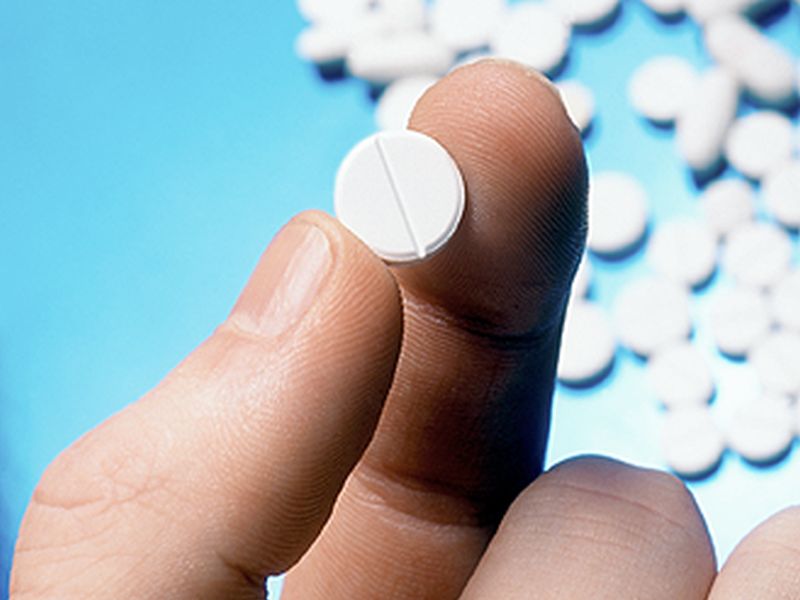THURSDAY, Aug. 22, 2019 (HealthDay News) — Imagine a single pill loaded with a battery of heart medications that you take once a day to cut your chances of heart attack, stroke and heart failure.
A new clinical trial has turned that idea into reality.
The “polypill” reduced the risk of life-threatening heart health problems by more than one-third during a five-year period in a group of more than 3,400 people aged 50 to 75.
What’s more, the risk decreased by more than half when researchers narrowed their focus to just participants who faithfully took the pill as directed.
The polypill in the study contained two common blood pressure drugs, a cholesterol-lowering statin and aspirin, the researchers said.
“The results of our study suggest that the polypill is effective in preventing cardiovascular disease,” said researcher Tom Marshall, a professor of public health and primary care with the University of Birmingham, in England. “This suggests that it should be considered as part of a strategy to prevent cardiovascular disease.”
However, this one-size-fits-all approach to heart disease prevention likely would work better in less-developed countries than the United States, said Dr. Ron Blankstein. He’s an associate physician of preventive cardiology with Brigham and Women’s Hospital in Boston.
U.S. patients often are reluctant to take cholesterol or blood pressure drugs, even after risk assessments are used to dial in the specific medications that would best protect their health, Blankstein noted. A single pill loaded with meds might be even less appealing.
“It’s something I could see as a combination that’s offered and available in the U.S., but whether that would change adherence or if the patients would find it that much more attractive to be on such a combination is still uncertain,” Blankstein said. “I think this is an approach that is going to work well in a low- to middle-income country, in a rural population.”
Heart patients aren’t very good at sticking with the medications they’ve been prescribed, the study authors said in background notes. About one-third of patients stop taking their meds as early as 90 days after having a heart attack.
The polypill is a concept that has knocked around for two decades now, offering a simpler cost-saving approach that would make it easier for people to take their heart medications.
However, evidence supporting the use of polypills to prevent heart disease in people who haven’t suffered a heart attack or stroke is lacking, the researchers noted.
To provide more evidence, the investigators recruited more than 6,800 participants from Golestan, a province in Iran.
Half of the people were randomly chosen to take the polypill, and the rest were provided lifestyle advice for lowering their risk of heart disease.
Overall, participants showed high adherence to their prescription. About 63% took the polypill as recommended, at least 70% of the time.
Polypill patients experienced an overall 34% decrease in their risk of major heart events over five years, compared with those who just received lifestyle advice. These heart events included acute coronary syndrome, heart attack, sudden heart death, heart failure, stroke, and procedures to reopen clogged arteries.
Benefit increased to a 40% reduction in risk among people with no history of heart disease, and up to 57% in people who stuck with the polypill as recommended.
The researchers estimated that 35 people would need to be treated with the polypill to prevent one person from having a life-threatening event. In patients with high adherence, the number needed to treat was 21.
“This clinical trial shows that the concept of a polypill, when applied to a large rural population in a low- to middle-income country, actually works,” said Blankstein, a member of the American College of Cardiology’s Prevention Section and Leadership Council.
Instead of carefully assessing individual risk, the researchers assigned people to the polypill solely based on age — a move that greatly simplifies distribution of heart meds, Blankstein noted.
Because of that, Marshall said, the intervention can be very low-cost, as little as a few cents a day in Iran.
It’s not clear whether an American polypill would be as affordable, Blankstein said.
“In the U.S., if someone creates this and they try to market it under a trade name, it would be a scenario where this could cost more, and that’s not the purpose,” Blankstein said. “The purpose is for it to cost less, especially if the whole point is to reduce cost and lower risk.”
The formulation of an American polypill would require a bit of discussion, as well. For example, it’s not clear that aspirin would be included in the pill, given recent clinical trial data and changes to U.S. prevention guidelines, Blankstein said.
“The perfect combination of what to put in a polypill I think is something that is very much up for debate,” Blankstein said. “If you made a simple polypill that was just one agent to lower cholesterol and one agent to lower blood pressure, I think there would be many populations that would benefit from that approach.”
The new study was published Aug. 22 in The Lancet.
More information
The American Heart Association has more about heart medications.
Copyright © 2026 HealthDay. All rights reserved.

